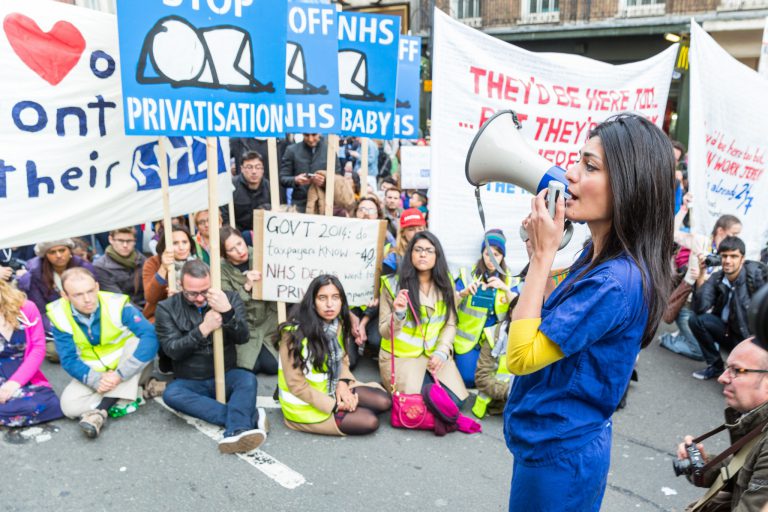
Recent cuts and controversy in the UK’s healthcare sector have not been shy of media attention, but rapidly declining prospects in the country’s medical sphere has caused more than one third of Medical School applicants to reconsider their choice of career.
In a recent poll by The Student Room, the UK’s largest online student community, 37 percent of prospective medical students claimed they no longer wanted to study the subject due to the ongoing dispute between Health Secretary, Jeremy Hunt, and the British Medical Association (BMA) over changes to their working contract.
Talks between the two bodies disintegrated in 2014, but the battle continued to escalate when ministers proposed a deal the following summer. In 2015, the government offered doctors an 11 percent basic pay increase – but the offering was somewhat overshadowed by other changes to the package.
UK Junior doctors likely to strike as government talks falter https://t.co/YIAGdxHLpL pic.twitter.com/yuNwTsMWb3
— C. Michael Gibson MD (@CMichaelGibson) December 30, 2015
Hunt aims to lower the number of hours that are currently classed as ‘unsociable’ by 25 percent, which results in doctors working for a much lower rate of pay, despite working outside of traditional working hours that run from nine to five.
The government claims reforms are needed to enforce more seven day weeks within the medical sector, meaning medics would have to work weekend hours but would not receive extra pay. The BMA cautioned that this decision could lead to doctors being overworked, and safeguards put in place to stop excessive working hours are beginning to unravel.
Dr Mark Porter, leader of the BMA, claims the government has not taken the union’s concerns “seriously” in spite of endless negotiations, and the body has been left with no choice but to plan industrial action.
@UK__News The public are not fools(unlike this Minister), they support and appreciate the dedication,commitment and value of our doctors.
— Mike Comerford (@comerfordarcher) January 5, 2016
“We sincerely regret the disruption that industrial action will cause,” says Porter, “but junior doctors have been left with no option. It is because the government’s proposals would be bad for patient care as well as junior doctors in the long-term that we are taking this stand.”
A series of strikes are now set to take place throughout the country, the first planned for Tuesday 12th January. Ninety eight percent of BMA members who participated in the ballot claimed to support strike action.
Many joined the discussion on The Student Room’s forum, some stating they are not surprised medical students are now reluctant to pick up the baton. “It would definitely put me off,” one contributor wrote under the name ‘Professor Oak’. “Sounds so tough to be a junior doctor. There are easier options to get paid more if you’re getting great grades unfortunately.”
Junior doctors look set to strike after talks between the Government and the BMA collapsed. pic.twitter.com/MsDeNHojdG
— UK News (@UK__News) December 30, 2015
Massimo, a third year med student at Oxford University states: “Jeremy Hunt is trying to push for a seven day NHS, but he’s forgetting the fact that doctors work seven days a week, 24 hours a day.”
A recent Freedom of Information request from the BBC found that in 2014-15, at least 100 UK surgeries applied to NHS England to stop taking on new patients, since the inability to fill staff vacancies has pushed them to “breaking point”.
Jack Wallington, community director of The Student Room, says: “With so many students put off studying medicine, it signals a huge setback for the future NHS and will be of great concern to the wider public.
“@RamonKaur: If we don’t protect our #UK #junior #doctors they will leave for a country that does #NHS Not just juniors. Consultants too.
— Stephen Westgarth (@SJ_Westgarth) December 28, 2015
“The message being sent out to our youth today is “why bother” with medicine, as over a third of our brightest students now look to other, better compensated careers, reducing our pool of talent within healthcare significantly.”
Local surgeries are already feeling the strain as they continually buckle under heightened patient demand, dwindling resources and a significant lack of GPs, and many critics have cast doubt over the future of the NHS.
“[The public’s] quality of healthcare looks set to reduce right at the time we face our greatest healthcare challenge in the history of the UK: an enormously top-heavy ageing population,” adds Wallington.
@SocietyGuardian we (the UK) should be supporting our junior doctors as much as possible not squeezing what is already a strained situation.
— Muted Minds (@mutedminds) December 30, 2015
In response to the upcoming strikes, Hunt has said: “Our absolute priority is patient safety and making sure that the NHS delivers high-quality care seven days a week – and we know that’s what doctors want too, so it is extremely disappointing that the BMA have chosen to take industrial action which helps no one.”
Image via Shutterstock.
Liked this? Then you’ll love these…
Hero In Training: Studying Nursing in the Modern Health Care Sector
Dreams of becoming a doctor? You’ll need to get your application right







